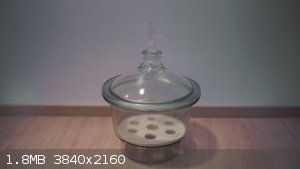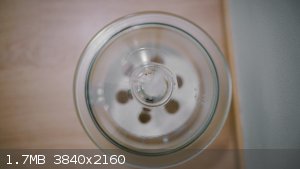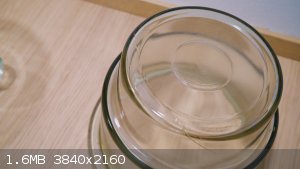| Pages:
1
2 |
Yttrium2
Perpetual Question Machine
    
Posts: 1104
Registered: 7-2-2015
Member Is Offline
|
|
There is a Chinese distillation kit made of heavy walled glass, on Amazon, with great reviews, which is why I'm asking.
It's main use is for intensive vacuum applications, correct?
[Edited on 3/31/2018 by Yttrium2]
|
|
|
zed
International Hazard
    
Posts: 2277
Registered: 6-9-2008
Location: Great State of Jefferson, City of Portland
Member Is Offline
Mood: Semi-repentant Sith Lord
|
|
Yttrium2,
I don't know the seller. Might be great stuff. Might be fake reviews.
I've got trust for what the guys here tell me.
Though I will attempt to visit the site.
Ummm. I took a look. More expensive than Deschem, by a lot.
When it comes to vacuum, I'm sure heavy walls might be useful. But, for a smaller flasks, I don't know how much difference it makes.
The bigger the flask under vacuum, the stronger its walls must be. At a certain pressure/vacuum... depending on the size of the vessel, you must
switch to a metal vessel.
Also of note, I like flat bottom vessels. Much easier to work with. Not however, as strong as completely spherical vessels. An arch reinforces
itself. Not so, that flat bottom.
[Edited on 1-4-2018 by zed]
|
|
|
Fyndium
International Hazard
    
Posts: 1192
Registered: 12-7-2020
Location: Not in USA
Member Is Offline
|
|
I received a chinese desiccator recently. I suppose the small inclusions and casting errors do not matter when applying vacuum?
They appear like cracks, but they are only on the surface of the glass.
  
[Edited on 2-8-2020 by Fyndium]
|
|
|
outer_limits
Hazard to Others
  
Posts: 139
Registered: 3-3-2020
Member Is Offline
Mood: hybridized
|
|
I wouldn't apply vacuum to a vessel that has visible glass breaks
[Edited on 2-8-2020 by outer_limits]
|
|
|
Fyndium
International Hazard
    
Posts: 1192
Registered: 12-7-2020
Location: Not in USA
Member Is Offline
|
|
Please note that these are not cracks or breaks but more like casting marks.
|
|
|
outer_limits
Hazard to Others
  
Posts: 139
Registered: 3-3-2020
Member Is Offline
Mood: hybridized
|
|
I wouldn't use it with vacuum still, I would rather contact the supplier and try to get another one without such things.
I have no expertise in materials endurance and I don't know how it affects the glass durability but I doubt that has no effect.
If you want to use it be careful - use something to protect from flying glass in case of implosion. It could be event strong tape which will hold the
glass together.
|
|
|
Fyndium
International Hazard
    
Posts: 1192
Registered: 12-7-2020
Location: Not in USA
Member Is Offline
|
|
I will proof it to high vacuum by wrapping it in stretch wrap and most likely every time I use it because I've got rolls of that stuff. That thing has
a volume of over 5 liters so it will cause a mess if it goes off.
|
|
|
S.C. Wack
bibliomaster
    
Posts: 2419
Registered: 7-5-2004
Location: Cornworld, Central USA
Member Is Offline
Mood: Enhanced
|
|
If it doesn't weaken the glass (presumably it does) it says something about the quality. You wouldn't see that on even Brazilian Pyrex.
|
|
|
macckone
International Hazard
    
Posts: 2159
Registered: 1-3-2013
Location: Over a mile high
Member Is Offline
Mood: Electrical
|
|
Even good looking vacuum chambers can implode.
The best way to tell if there is a problem is by polarized examination.
Stresses stand out.
|
|
|
Dr.Bob
International Hazard
    
Posts: 2656
Registered: 26-1-2011
Location: USA - NC
Member Is Offline
Mood: No Mood
|
|
Thick glass will withstand washing and handling better, terrible with direct flame or other harsh heating.
I have been doing chemistry for 30 plus years, and have never experienced or seen any flask break due to just vacuum. Even the older thin Pyrex round
bottoms that are 20 plus years old don't break due to vacuum, unless hit or heating under vacuum harshly (like a flame or direct hot surface). I use
a rotovap almost every day, and have yet to break a single flask on one, even though I often use a strong vacuum on it. I also dry flasks on a
vacuum manifold almost every day, none have ever broken under vacuum.
But if they get cracked in washing or moving often, and once they have any crack, even a tiny star crack, they are not safe for vacuum work. I have
used them for (after marking well) for other minor tasks, not important work, like storing material. So the thickness of the glass only matters to
avoid breakage in handleing, thicker is better for handling, but thinner is better for heating.
I have also seen a few flasks broken by pressure as well, but again, typically when hit while under some pressure. I blew a septa off a 3 RBF today
under nitrogen pressure, worst problem is if an addition funnel or condenser pops off due to pressure. (I was trying to canulate a solution from one
flask to another, and only 5-10 psi can be enough to blow off pieces if not securely fastened. ) Had I accidentily hit the flask with a piece of
steel or other glass, it could have easily broken and shattered.
So my advice is don't worry too much about the thickness, any will do, the quality of the joints is much more important, especially if doing vacuum
work. And handle it carefully, and don't use cracked glass for vacuum or critical work. And don't ever heat glass with a flame unless you really
know what you are doing, it is very hard to do without shattering the flask. Practice with water or something safe, not organics or acids. I've
seen people heat acids to distill with a flame, and that is madness. Safe for heating flammables with a flame, unless in a hood and really safe.
Fires happen, and I have seen some big ones, they grow fast.
|
|
|
pneumatician
Hazard to Others
  
Posts: 409
Registered: 27-5-2013
Location: Magonia
Member Is Offline
Mood: ■■■■■■■■■■ INRI ■■■■■■■■■■ ** Igne Natura Renovatur Integra **
|
|
Distilling a solid salt at 360 ºC and... horrible "CRACKKKKK" :-O
https://www.youtube.com/watch?v=2m0IiAAH1Y0
new item, very fat glass, used in lower temps 2 times, 90€ in the trash
|
|
|
Fyndium
International Hazard
    
Posts: 1192
Registered: 12-7-2020
Location: Not in USA
Member Is Offline
|
|
I have not applied direct heat to any glass since I started chemistry again a year ago, I exclusively use some sort of heating bath and my go-to has
been CaCl2 up to 150C. I ain't got a heating mantle (yet). Only exception was when I distilled sulfuric acid, but I used a flask which I determined I
was ready to lose.
It appears that you used an intensive heat source to reach that temp obviously, which led to sufficient thermal stress to crack that reactor. Large
opening would allow easier application and removal of solids, but apparently reactor glassware tends to be thicker.
Getting much above 200C with heating baths seem to be a bit tricky. People have used sand or salt baths for these, I haven't tried but apparently for
a couple of reactions I've got to see if they could be heated effectively to above, since any oil bath seems to start smoking excessively even much
below 200. Steel shots afraid me because they have very high thermal conductivity, which could stress the glass.
Perhaps a combination of pre-formed glass or ceramic wool mantle placed into a pit of steel could provide good and stable heating for high temperature
reactions.
[Edited on 29-1-2021 by Fyndium]
|
|
|
| Pages:
1
2 |